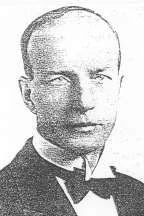Member Biography
Roy William Egbert Loucks
(1884.10.31 - 1931.03.30)
CE, DLS, SLS, ALS
Commission #043 (1912.04.15)
Roy William Egbert Loucks was born on the 31st October 1884 at Meaford, Ontario, the son of Jacob and Sarah Ann Loucks. He attended school at Meaford, and obtained his senior matriculation with only two years attendance at high school at Meaford. He was awarded first prize in general proficiency and was gold medallist in oratory. At the "model" school he headed a class of 21, and taught school near Meaford for 3 years.
He was an honour graduate in civil engineering from the University of Toronto in 1909 and was for 2 years a student in mining engineering. In the first year he came first in his class, and in the other years was close to the top. He was active in the student organisations.
After graduating, he headed a prospecting expedition into northern Ontario for Wm. Butler, millionaire capitalist of New York city, a man closely associated with the Guggenheims in mining enterprises.
He was commissioned as a Dominion land surveyor on let March, 1912, as a Saskatchewan land Surveyor on 15th April, 1912, and Alberta lend surveyor on 29th December, 1912.
For the next two years after prospecting he was engaged on Dominion land surveys for the Dominion government, one of which was on contract work for township subdivision in northern Saskatchewan.
After a few months practical experience on rail road construction with the Canadian Pacific Railway Company in Saskatchewan, on 1st November, 1912, he entered into partnership with Mr. T. W. Brown to form the firm of Brown & Loucks of Saskatoon.
He organised the North West Construction Company, and carried opt several important contracts for town waterworks, sewerage, etc.
On 1st January 1915, he joined the staff of the Surveys Branch of the Land Titles Offices, and acted as Deputy Chief Surveyor and Field Inspector to the Land Titles offices of Saskatchewan up to the time of his death on 30th March 1931.
He married Miss Mary Olive Burns at Neepawa, Manitoba, on 19th August 1916. There are two children of school age - Isabel and William..
Jacob Loucks, the father of R. W. E. Loucks, died, age 72, on 2nd November 1930.
Mr. R.W.E Loucks was Of United Empire Loyalist stock. He was very proud of his ancestors and collected quite a fund of information about them, but his death prevented his completion of this work.
The original Loucks came to this continent about the year 1710. At the time of the American revolution these ancestors were living at Schoharie, Stonerabie and the old Johnston settlement on the Mohawk river near the present city of Albany, the capital of New York state. The war divided this family as it did many others. Five sons were loyalists. One of these, Richard, was imprisoned and fined twenty pounds at Stonerabie, N.Y. for loyalty to Britain. The brothers, actuated by loyalty, and probably influenced by the harsh treatment meted out to loyalists, came to Canada George Loucks, credited with being the ancestor of R. W. E. Loucks, came to Canada with a family of six boys and a mule, and settled near Belleville. Ontario, The Loucks fraternity stayed in this district until 1871, 'when the branch under review moved north to Meaford, Ontario.
Mr. R. W. E. Loucks was one of the founders of the Gyro club of Regina, and was its first president. He was soon afterwards governor of Gyro district number VII, a large area which includes Regina. He was chairman of the committee which drew up the constitution of the Regina club.
He was secretary treasurer of the Saskatchewan branch of the Engineering Institute of Canada from 11th March, 1926 until his death. He was appointed Councillor for Saskatchewan for the year 1931-32. When the Professional Society was formed he was offered the secretaryship, but was forced to refuse on account of ill-health.
Mr. Loucks took a keen interest in his profession and followed very closely the affairs of the Saskatchewan Land Surveyors Association and the Engineering Institute of Canada. He was president of the Saskatchewan Land Surveyors Association for the year 1917.
He was a surveyor and engineer by nature and temperament. However, he was many sided, and had a strong legal strain in his character, and undoubtedly would have made a successful barrister.
He was superintendent of the Sunday school at Knox United Church and taught a class beside. He was alas a manager of the church.
Mr. Loucks was chairman of the decorations committee Regina for the Canadian confederation diamond jubilee celebration in 1927.
As can be seen, he had a wide range of interests and activities apart from his immediate duties. He gave to all he undertook, conscientious thought and unsparing industry.
In spite of his numerous outside activities and interests, he was a man of domestic habits, fond of his home and family.
To his professional duties and other activities he brought an unusually wide breadth of vision and a quiet persistency. His accomplishments show that he had powers out of the ordinary. He was untiringly industrious, active minded, intensely practical and far-seeing, and possessed penetrating analytical powers of mind and an instinctive knowledge of psychology. He was super-methodical, and as a soldier he would undoubtedly have kept a note of every shot he fired. One of his leading characteristics was his resourcefulness; he was never beaten by circumstances. His soul and intellect were a match for all situations. He inspired a quiet confidence and one felt that he could safely be trusted or followed.
His was a creative and organising intelligence backed by an enormous power of continuous application and balanced by a well rounded nature,
Withal he was unobtrusive, unpretentious and even tempered.
The speciality of his mind was a strong simplicity.
He took a plain view of every subject. Specious fallacies might be suggested around him, but he was complication proof. He said or wrote his views in plain, unadorned but apt English. His mind was like a registering machine with a good index. It took in all the involved data and then indicated with simple precision what their sum total effect was. He made a difficult, involved problem look simple. He knew exactly what were the facts upon which he founded his opinion and the inference from those facts, and his mind very seldom fluctuated. This was one of the comforts of dealing with him. One always knew where one would find his mind. Unless the data had altered, his inference would be unchanged. It might be added that his inference was almost sure to be sound.
He possessed the subtle art of being able to put a thought into the form which gave it the easiest admittance into minds not already prepared for its acceptance.
He believed that truth, honour and integrity were best. This was his leading theme in his Sunday school class. He was truly a civilized man - one of nature's gentlemen.
Every item of his professional and other work could be accepted without question as the fruit of honest endeavour. To every task he gave all that was in him. There was nothing shoddy about his work and he did not write or say a thing of which he had not made sure.
He was very approachable and always listened to what one wished to say to him. He was invariably kind and considerate in word and action, and had a tendency to avoid what was unpleasant, although he could force himself to face unpleasant scenes when he thought it really necessary, much to the surprise of those who had not previously seen this aspect of his nature.
Like all big men, he was always willing to share his knowledge and help others. His death at such an early age was a tragedy, and caused the loss of a man whose type is much needed in the world. Mr. Loucks is gone, but he will long be remembered as an earnest, high minded citizen.
Biography Submitted to the SLSA Annual Meeting, 1932


